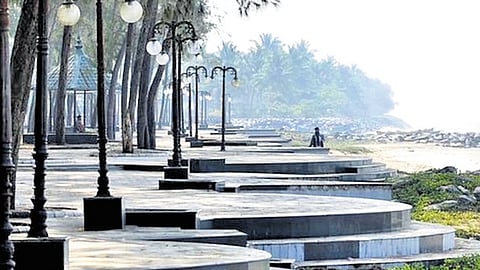Kozhikode's Kappad beach retains Blue Flag certification, but local community reaps no benefits
KOZHIKODE: Kappad beach in Kozhikode, has once again earned the prestigious Blue Flag certification, marking the fourth consecutive year it has achieved this honour.
Awarded by the Denmark-based Foundation for Environmental Education (FEE), the certification signifies that the beach meets stringent international standards for cleanliness, environmental sustainability and safety.
This recognition places Kappad beach in an elite category of environmentally conscious and well-maintained tourist destinations, however, locals remain sceptical about the tangible benefits of this accolade.
The Blue Flag certification is awarded to beaches that meet 33 criteria under categories such as environmental education and information, water quality, safety and services, and proper waste and environmental management. Kappad beach underwent significant development in 2020, including installation of solar-powered lights, bio-toilets, and disabled-friendly pathways, to comply with these requirements.
While the Blue Flag certification is undoubtedly a feather in Kappad Beach’s cap, the challenge lies in translating this recognition into tangible benefits for the local community.
Residents argue that the Blue Flag status has not translated into increased tourist footfall. While beaches like Varkala, Kovalam, and Marari have witnessed a steady influx of both domestic and international tourists, Kappad remains relatively underwhelming in attracting visitors.
According to them, many potential tourists, even within India, are unaware of the Blue Flag certification and its significance. There has been minimal effort to promote Kappad beach as a Blue Flag destination, especially in global markets. Moreover, limited public transport options and absence of direct rail or air connectivity make it challenging for tourists to visit Kappad.
While the beach is clean, locals point out the lack of sufficient restaurants, accommodation options and recreational facilities that would entice travellers to stay longer. “We were hopeful that the Blue Flag certification would bring more tourists, but nothing has changed,” says Rameshan Nair, a fisherman and long-time resident of Kappad. “We still struggle to find customers for our boats and stalls. The government needs to promote the beach better.”
Meenakshi Amma, who runs a small tea shop near the beach, believes the certification has done more for environmental preservation than for economic upliftment.
“The beach looks better, no doubt, but tourists don’t come in big numbers. If they did, we’d all benefit,” she said.
Kappad beach holds historical significance as the site where Portuguese explorer Vasco da Gama first landed in India in 1498. Despite the rich heritage, the beach has failed to capitalise on its historical and ecological appeal.
Neighbouring states like Goa and Karnataka have successfully leveraged such certifications to boost tourism. For instance, Karnataka’s Padubidri beach, another Blue Flag-certified site, has gained popularity due to aggressive marketing campaigns and improved tourist facilities.
According to experts, without strategic investments in tourism promotion and infrastructure, the beach risks remaining a hidden gem, admired from afar but seldom visited.
They suggest a multi-pronged approach to maximise the potential of Kappad beach by launching targeted campaigns highlighting the beach’s Blue Flag status and historical importance, and introducing shuttle services from Kozhikode city and nearby airports. They emphasised ensuring local participation in tourism activities will help boost the economy.

